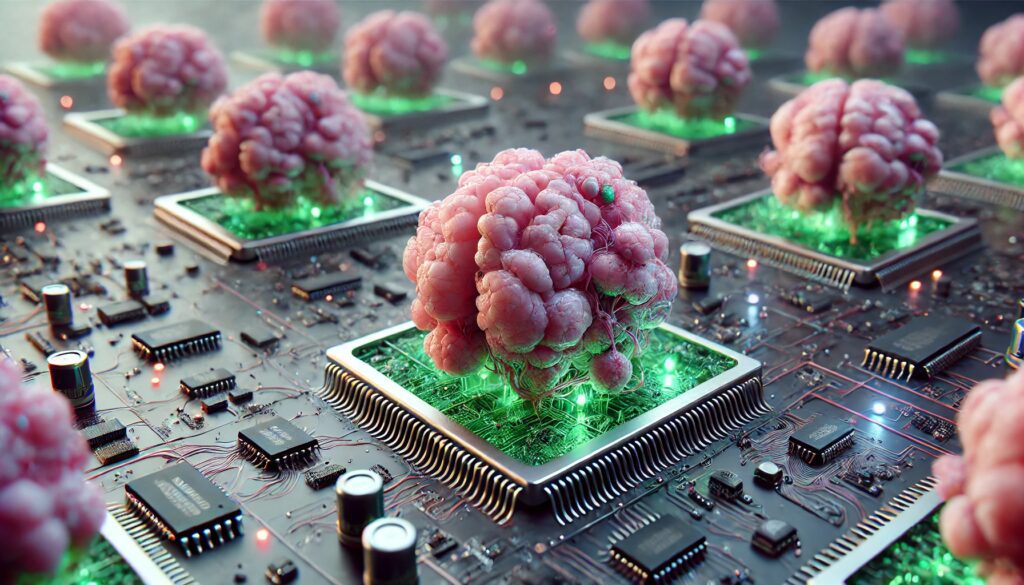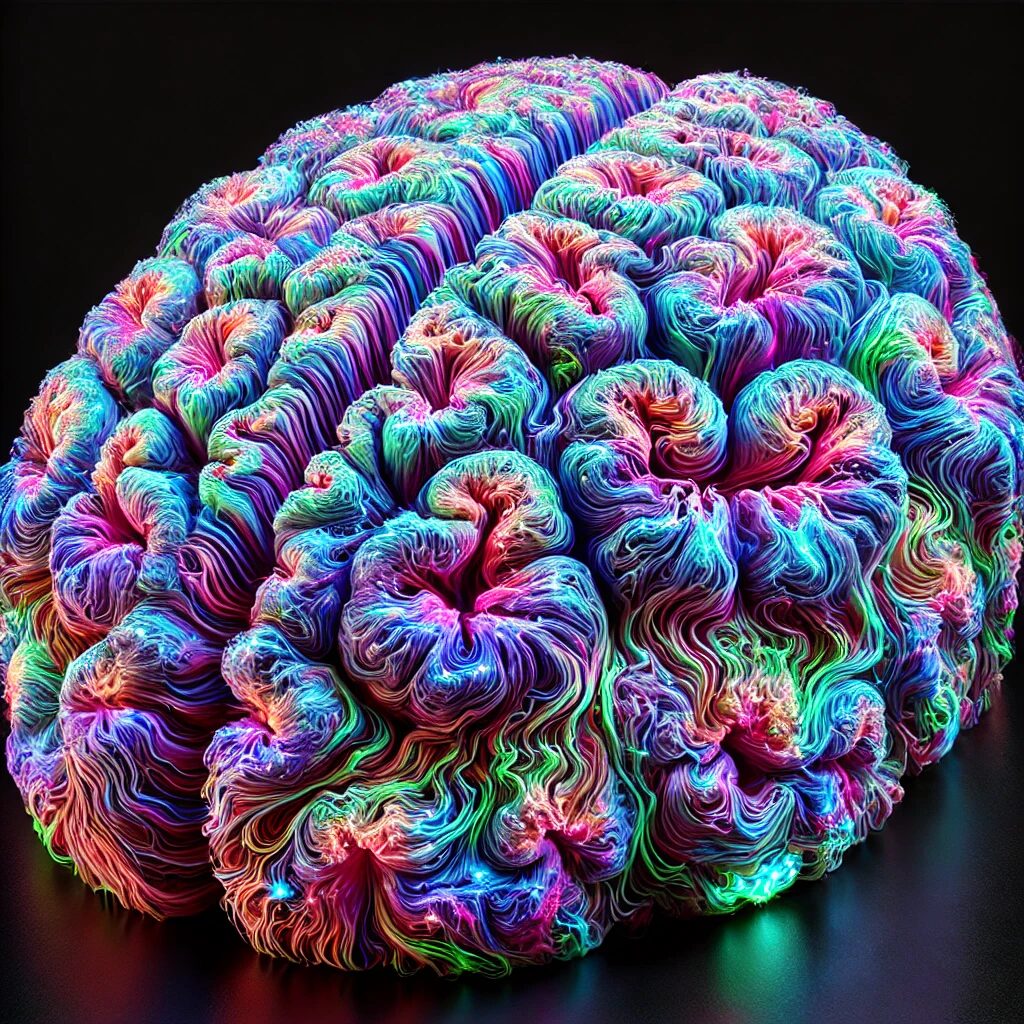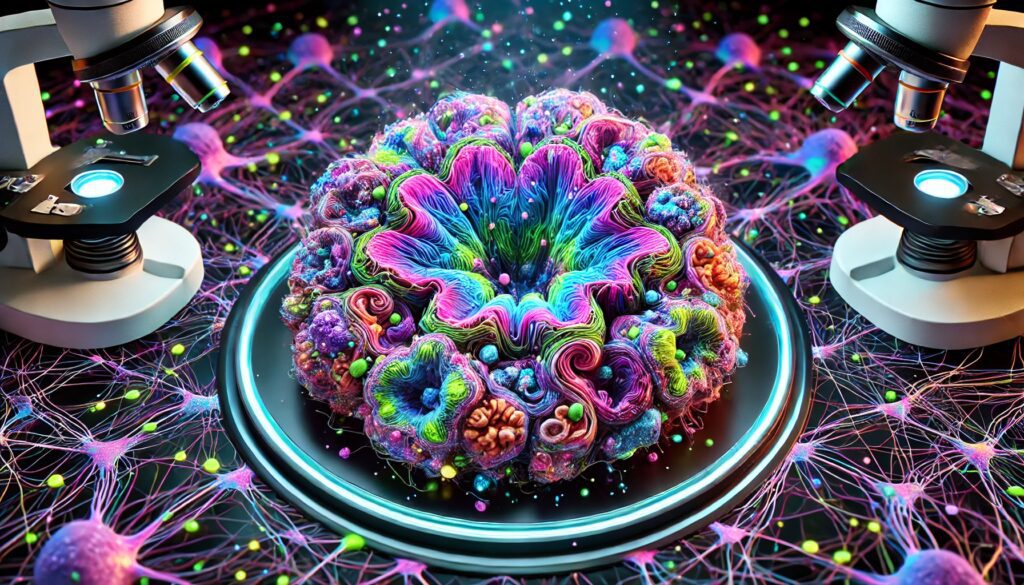
What Lab-Grown Brains Could Teach Us About Human Consciousness
Science pushes the frontiers of neuroscience and artificial intelligence. Researchers are turning to a surprising new model to understand human consciousness: lab-grown mini-brains, also known as brain organoids.
These clusters of neural cells mimic aspects of human brain function, opening doors to study the complexities of consciousness, memory, and disease in unprecedented ways. But what can organoid intelligence really teach us about our own minds?
The Basics of Brain Organoids: What Are They?
How Brain Organoids Are Created
Brain organoids, or “mini-brains,” are grown from stem cells—cells that have the potential to develop into many different cell types. By exposing these stem cells to specific growth factors, scientists can guide them to form neural structures resembling parts of the human brain. These lab-grown clusters contain neurons and other brain cells that can communicate with each other, displaying some characteristics of real brain function.
Unlike full brains, organoids lack a defined shape or full connectivity. However, they do produce electrical signals and respond to stimuli, allowing researchers to observe neural activity that may shed light on fundamental aspects of brain function.
Why Brain Organoids Matter for Neuroscience
Brain organoids offer a unique model to study human brain development and disease, especially since animal brains differ significantly from ours. They allow scientists to observe the early stages of brain growth, offering insights into neurological disorders like autism and Alzheimer’s. But beyond their medical applications, brain organoids are becoming powerful tools for exploring consciousness and cognition.
Although organoids are far from reaching human-level complexity, their ability to produce brain-like activity raises exciting questions about intelligence, memory formation, and the potential for understanding the essence of conscious experience.
What Is Organoid Intelligence?
Defining Organoid Intelligence
Organoid intelligence refers to the potential cognitive and computational capabilities of brain organoids. While AI relies on silicon-based chips, organoid intelligence leverages biological networks similar to the human brain. This “bio-computing” approach may provide a closer model of human thought and memory processes than even the most advanced AI.
Although organoid intelligence is in its infancy, researchers hope that by studying brain organoids, we can better understand natural intelligence and even use them in specific applications, such as testing pharmaceuticals or developing brain-computer interfaces.
Differences Between Organoid Intelligence and Artificial Intelligence
Organoid intelligence and artificial intelligence (AI) differ fundamentally in their structures and learning processes. While AI is built from silicon and relies on algorithms to process information, organoid intelligence is based on organic cells that mimic the biological behavior of a human brain. AI excels at tasks like image recognition and data analysis, but it lacks the spontaneous, adaptable qualities of biological neural networks.
This distinction makes organoid intelligence potentially better suited for tasks that require human-like intuition, adaptability, or the ability to recognize abstract patterns. In other words, while AI might help a car recognize pedestrians, organoid intelligence could, in theory, help us understand how humans intuitively recognize emotions or complex social dynamics.
The Potential of Brain Organoids in Consciousness Research

Mimicking Neural Activity and Memory Formation
One of the most exciting possibilities with brain organoids is studying neural plasticity, or the brain’s ability to reorganize itself by forming new connections. By observing organoids over time, researchers can examine how these mini-brains create, store, and recall information—a process that closely resembles human memory formation.
Scientists have already made breakthroughs in creating organoids that mimic early brain development, providing a unique model for observing the conditions under which consciousness could arise. By tracking how neurons in organoids respond to various stimuli, researchers are learning how networks of brain cells process information, potentially leading to insights into the nature of self-awareness and memory.
Organoids and the Origins of Consciousness
While organoids are far from experiencing true consciousness, studying their development and function could help answer fundamental questions: When does consciousness begin? Is it the result of a specific organization of cells, or a product of neural activity patterns? By analyzing brain organoids at various stages, researchers can better understand which processes are necessary for consciousness, potentially providing clues about its origins.
Some scientists hypothesize that consciousness could emerge in organoids given enough complexity and connectivity. Though still speculative, understanding how consciousness arises in simple neural structures could be a first step toward solving one of the greatest mysteries of the mind.
Ethical Considerations: Could Organoids Become Conscious?
The Moral Implications of Conscious Organoids
The idea of a conscious organoid raises profound ethical questions. If a lab-grown brain develops consciousness, it could potentially experience sensations, pain, or awareness. This possibility challenges current bioethics, as we would need to consider the rights of an artificially grown but potentially sentient entity. At what point, if any, would a brain organoid deserve ethical consideration similar to a human?
These questions are speculative, but as brain organoids become more complex, researchers are already setting ethical guidelines to ensure they avoid creating anything that might experience suffering. Clear protocols are necessary as we continue to push the boundaries of organoid intelligence.
Guidelines and Regulations for Organoid Research
Research involving brain organoids is regulated, but the rapid pace of advancements in this field may soon require new guidelines. The National Institutes of Health (NIH) and other organizations are already considering these implications, creating frameworks for researchers to responsibly study organoid intelligence without risking unethical outcomes. Regulations typically focus on limiting the size, complexity, and developmental stage of organoids to avoid scenarios that could involve conscious experiences.
Additionally, researchers are working with ethicists to navigate these emerging challenges responsibly. As the field grows, these guidelines will likely evolve, providing a structured approach to investigating consciousness while prioritizing ethical concerns.
Future Directions: What Organoid Intelligence Could Reveal

Understanding Neurodevelopmental and Degenerative Diseases
Beyond consciousness research, brain organoids could significantly advance our understanding of neurodevelopmental and neurodegenerative diseases. By studying organoids with genetic mutations or abnormalities, scientists can explore the progression of conditions like Alzheimer’s, schizophrenia, or epilepsy, offering potential insights into prevention and treatment.
Organoids also enable “personalized” disease models, where a patient’s cells are used to grow an organoid for studying their unique genetic makeup and responses to treatment. This could revolutionize how we understand and treat neurological conditions on an individual basis.
The Quest for Artificial Consciousness
As brain organoid technology advances, some researchers speculate that we could eventually create a form of artificial consciousness—not in silicon-based computers, but in lab-grown biological systems. While this remains a distant possibility, understanding the biological foundations of consciousness through organoid intelligence could bring us closer to creating synthetic entities that think, feel, and even experience subjective awareness.
Such breakthroughs could have profound implications not only for neuroscience but also for philosophy, ethics, and even technology. Imagine the possibility of bio-inspired computing systems that think and learn in ways closer to human cognition than ever before, transforming our understanding of intelligence itself.
Pushing the Boundaries of Brain-Computer Interfaces (BCIs)
Brain organoids could eventually play a role in advancing brain-computer interfaces (BCIs), allowing us to better understand the neural codes that link human thought to action. BCIs are already helping patients with neurological conditions regain mobility and communication, but integrating knowledge from organoid intelligence could make these systems more precise, intuitive, and adaptive. By exploring how organoids process signals, researchers could improve the accuracy and responsiveness of BCIs, bridging the gap between human intention and technological response.
The Journey Ahead: Exploring Consciousness Through Organoid Intelligence
Organoid intelligence is still in its infancy, yet it holds profound potential for unraveling the mysteries of human consciousness, disease, and neurodevelopment. As science delves deeper into the biology of the mind, the insights gained from studying brain organoids could lead to breakthroughs across medicine, computing, and philosophy.
In the search for understanding what it means to be conscious, lab-grown brains offer a fascinating—and ethically complex—window into our own minds. The journey to uncover the origins of consciousness through organoid intelligence has just begun, promising a future where we may finally unlock some of the deepest secrets of human existence.
Italian scientists have been at the forefront of this research.
—
“The research team’s approach is about making AI more brain-like. How artificial intelligence can develop in the future and even achieve possible self-awareness are questions that we will have to deal with more and more frequently in the future,” emphasized Claudio Anastasio, an expert in neural networks and artificial intelligence, at a conference on ‘Artificial intelligence: opportunities and risks’ organized at the headquarters of the Italian Space Agency in Rome. The new biocomputers will be able to guarantee enormous performance at very low energy costs.
The development of Brainoware represents a significant step toward creating biocomputers that could perform complex tasks with greater efficiency than traditional silicon-based systems.
FAQs
Could organoid intelligence be used in medicine?
Yes, organoid intelligence holds great potential in medicine, especially for studying neurodevelopmental and neurodegenerative diseases like Alzheimer’s and autism. Organoids can model these diseases in ways that animal models cannot, potentially leading to personalized treatments and breakthroughs in understanding brain disorders.
How is organoid intelligence different from artificial intelligence?
Organoid intelligence is based on biological neural networks, while artificial intelligence relies on silicon-based technology and algorithms. Unlike AI, organoid intelligence replicates biological processes that more closely resemble human brain function, making it potentially more adaptable and intuitive for certain cognitive tasks.
Can organoids be used for brain-computer interfaces (BCIs)?
Brain organoids may eventually contribute to the development of brain-computer interfaces (BCIs) by helping researchers understand how neurons process signals. Insights from organoid intelligence could lead to more accurate, responsive BCIs, improving assistive technology for individuals with neurological impairments.
What are the future possibilities of organoid intelligence?
Organoid intelligence could lead to breakthroughs in understanding consciousness, personalized medicine, and neurotechnology. It may also contribute to ethical discussions about synthetic consciousness, bio-inspired computing, and our understanding of intelligence. The field is in early stages, but the possibilities are vast, spanning from medical advancements to philosophical insights about the nature of human experience.
Could organoids eventually replace animal models in research?
Organoids have the potential to reduce reliance on animal models for certain types of research, especially when studying human-specific brain functions and diseases. Since brain organoids are derived from human cells, they can provide insights that animal brains cannot, particularly in studying human neurodevelopment, neurodegenerative diseases, and personalized medicine. While organoids are unlikely to replace animal models entirely, they offer a powerful alternative for certain experimental scenarios, possibly leading to more humane and accurate research methods.
How close are we to creating a conscious organoid?
We are still far from creating a conscious organoid. While organoids can mimic some basic brain functions, they lack the structure, connectivity, and complexity of a fully developed human brain. Consciousness is believed to require intricate neural circuits and communication pathways that current organoids do not possess. However, studying the stages at which neural activity begins in organoids can provide insights into how consciousness might emerge in more complex systems, potentially informing theories about human consciousness.
What insights have organoids provided about brain diseases so far?
Brain organoids have already offered valuable insights into diseases like Alzheimer’s, autism, and epilepsy. For example, organoids derived from patients with genetic forms of Alzheimer’s disease allow researchers to observe the disease’s progression and test potential treatments. Similarly, organoids help scientists understand the neural characteristics of autism and other developmental disorders. As organoid research advances, it holds promise for developing new therapies and personalized treatment approaches for a wide range of neurological conditions.
Can organoids store memories?
Currently, brain organoids can exhibit neural plasticity, or the ability to reorganize neural connections, but they do not store memories in the way a human brain does. Some experiments suggest that organoids can respond differently to repeated stimuli, hinting at memory-like behavior. However, true memory storage requires a level of complexity that existing organoids do not yet possess. Research in this area could eventually reveal more about how memories form and are stored in the human brain.
Are there risks involved in creating more complex brain organoids?
As brain organoids become more advanced, there are potential risks, particularly ethical and regulatory concerns. The possibility of creating organoids with the capacity for sentience, self-awareness, or suffering raises moral questions about the treatment and rights of lab-grown neural structures. Additionally, as the field progresses, scientists and regulators must be vigilant about unintended consequences, ensuring that organoid research remains safe, ethical, and responsible.
How are brain organoids contributing to the development of personalized medicine?
Brain organoids can be created from a patient’s own cells, providing a “personalized” model of their unique genetic and biological characteristics. This allows researchers to study how a particular individual’s cells respond to specific drugs, offering a tailored approach to treating conditions like epilepsy, Alzheimer’s, and Parkinson’s disease. Personalized organoids could revolutionize medicine by enabling doctors to test treatments directly on patient-specific models, improving both the effectiveness and safety of therapies.
Could organoids help solve the mystery of consciousness?
Brain organoids offer a unique opportunity to explore consciousness by allowing scientists to observe the development of neural networks and complex behaviors in controlled environments. While they are not conscious themselves, studying organoids can provide insights into the conditions and structures that might be necessary for consciousness. Observing how organoids process stimuli, organize information, and respond to changes could bring us closer to understanding the mechanisms that underlie conscious experience.
What are the current limitations of brain organoid technology?
Despite their promise, brain organoids face several limitations. They are structurally simpler than real brains, lack blood vessels (vascularization), and have limited lifespan and connectivity. These factors limit their capacity for complex processing and reduce their resemblance to full human brains. Scientists are working to improve these aspects, such as by introducing vascularization, but creating organoids with true brain-like function remains a long-term challenge.
How are governments and institutions regulating organoid research?
As organoid research grows, so does the need for oversight. Currently, regulatory bodies like the National Institutes of Health (NIH) and International Society for Stem Cell Research (ISSCR) are establishing guidelines to ensure ethical practices. Regulations often address the complexity, developmental stage, and permissible use of brain organoids, especially to prevent creating structures capable of experiencing pain or consciousness. These guidelines evolve with advancements in the field, aiming to balance scientific progress with ethical responsibility.
What is the potential impact of organoid intelligence on AI and computing?
Organoid intelligence could inspire new directions in AI and computing by introducing bio-computing models that mimic human-like adaptability and learning. Studying how organoids process information could lead to the development of more efficient, flexible, and intuitive AI systems. This bio-inspired approach could complement traditional silicon-based AI, particularly for tasks that require human-like reasoning, pattern recognition, or adaptability.
Is it possible to integrate brain organoids into robotics or other technologies?
While highly speculative, some researchers envision future scenarios where bio-computing structures, such as organoids, could be integrated into robotics or computational systems. Such integration could bring biological intelligence into hybrid systems, creating robots or interfaces with more human-like adaptability and decision-making abilities. However, practical and ethical obstacles currently make this a distant prospect, with current research focusing on understanding organoid intelligence rather than integrating it into technologies.
These additional FAQs provide deeper insights into the potential and challenges of organoid intelligence, addressing both its current applications and its future possibilities in neuroscience, medicine, and technology. As organoid research advances, these questions will continue to evolve, reflecting new discoveries and ethical considerations in this groundbreaking field.
Resources
Academic Journals and Research Papers
- Nature Neuroscience – https://www.nature.com/neuro
This journal regularly publishes cutting-edge research on brain organoids, neurodevelopment, and related topics. Articles here provide a scientific perspective on the mechanisms of consciousness and developments in brain organoid research. - Cell Stem Cell – https://www.cell.com/cell-stem-cell
Cell Stem Cell covers research in stem cell biology, including studies on the development and applications of brain organoids. This is a valuable resource for understanding the latest advances in organoid technology and applications in neuroscience. - The Journal of Neuroscience – https://www.jneurosci.org
This journal publishes research on brain function, development, and consciousness. Articles related to neural networks and brain modeling can provide insights into the biological foundations of consciousness. - ArXiv Preprints – https://arxiv.org
ArXiv hosts open-access preprints in biology, computer science, and cognitive science, including new studies on brain organoids and theoretical frameworks for consciousness. Researchers often upload preliminary studies here, offering early access to new findings.
Online Platforms and Resources
- National Institutes of Health (NIH) – Stem Cell Research – https://stemcells.nih.gov
The NIH provides accessible resources and guidelines on stem cell and organoid research. Their website includes articles and ethical guidelines for conducting organoid experiments responsibly. - The Allen Institute for Brain Science – https://alleninstitute.org
Known for its contributions to brain mapping and neuroscience, the Allen Institute offers open-access resources, including data and tools for brain research. Researchers studying consciousness and neural networks often reference these resources. - BrainOrganoid.com (Organoid Research Database) – https://brainorganoid.com
This platform curates news, articles, and research papers specifically focused on brain organoids and their applications in medical and cognitive research. It’s a valuable resource for staying updated on the latest developments in the field. - Cold Spring Harbor Laboratory – BioRxiv – https://www.biorxiv.org
BioRxiv hosts preprints of new research in biology, including organoid and consciousness studies. Articles here provide early access to experimental findings from research institutions worldwide. - Khan Academy – Neuroscience Course – https://www.khanacademy.org
This free course provides foundational knowledge in neuroscience and brain function, helpful for understanding the basics of neural networks, neurodevelopment, and how organoids could be used to study the brain.